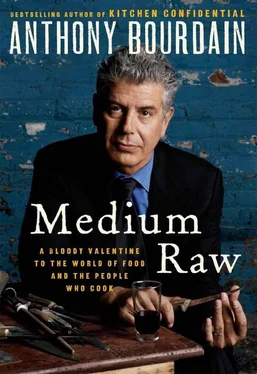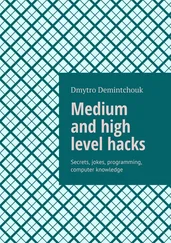Or did I get it all wrong?
I was so supremely naive about somany things when I wrote Kitchen Confidential —my hatred for all things Food Network being just one of them. From my vantage point in a busy working kitchen, when I’d see Emeril and Bobby on the tube, they looked like creatures from another planet—bizarrely, artificially cheerful creatures in a candy-colored galaxy in no way resembling my own. They were as far from my experience or understanding as Barney the purple dinosaur—or the saxophone stylings of Kenny G. The fact that people—strangers—seemed to love them, Emeril’s studio audience, for instance, clapping and hooting with every mention of gah-lic, only made me more hostile.
In my life, in my world, I took it as an article of faith that chefs were unlovable. That’s why we were chefs. We were basically…bad people—which is why we lived the way we did, this half-life of work followed by hanging out with others who lived the same life, followed by whatever slivers of emulated normal life we had left to us. Nobody loved us. Not really. How could they, after all? As chefs, we were proudly dysfunctional. We were misfits. We knew we were misfits, we sensed the empty parts of our souls, the missing parts of our personalities, and this was what had brought us to our profession, had made us what we were.
I despised their very likability, as it was a denial of the quality I’d always seen as our best and most distinguishing: our otherness.
Rachael Ray, predictably, symbolized everything I thought wrong—which is to say, incomprehensible to me—about the Brave New World of celebrity chefs, as she wasn’t even one of “us.” Back then, hearing that title applied to just anyone in an apron was particularly angering. It burned. (Still does a little.)
What a pitiable fool I was.
But my low opinion of the Food Network actually went back a little further in time. Back to when they were a relatively tiny, sad-sack start-up with studios on the upper floors of an office building on Sixth Avenue, a viewership of about eight people, and the production values of late-night public-access porn. Before Emeril and Bobby and Mario helped build them into a powerhouse international brand. (In those days, such luminaries of the dining scene as Donna Hanover [then Giuliani] and Alan Richman, Bill Boggs and Nina Griscom, would sit around in tiny, office-size rooms, barely enough room for the cameras, showing pre-recorded promo reels—the type of crap they show on the hotel channel when you turn on the tube at the Sheraton.) You know the stuff: happy “customers” awkwardly chawing on surf and turf, followed by “Chef Lou’s signature cheesecake…with a flavor that says ‘Oooh la-la!’” After which, Alan or Donna or Nina or Bill would take a few desultory bites from a sample of same—which had been actually FedExed from whatever resort or far-flung dung hole they were promoting that week.
I was invited on to cook salmon. I was working at Sullivan’s at the time, and flogging my firstborn (and already abandoned by its publisher) book, a crime novel called Bone in the Throat . I arrived to find a large and utterly septic central kitchen/prep area, its sinks heaped with dirty pots and pans, refrigerators jammed with plastic-wrapped mystery packages that no one would ever open. Every surface was covered with neglected food from on-camera demonstrations from who knows how long ago, a panorama of graying, oxidizing, and actively decaying food beset with fruit flies. The “chef” in charge of this facility stood around with one finger jammed up his nose to the knuckle, seemingly oblivious to the carnage around him. Cast and crew from the various productions would wander in from time to time and actually pick at this once-edible landfill and eat from it. Once in the studio, cooking on camera was invariably over a single electric burner, which stank of the encrusted spills left by previous victims. For my salmon demonstration, I recall, I had to scrub and wash my own grill pan, after retrieving it from the bottom of a sink as multilayered as the ruins of ancient Troy.
This unimpressive first encounter in no way made me actively “hate” the Food Network. It would be more accurate to say I was dismissive. I didn’t take them seriously. How could one?
And, to be honest with myself, I never really “hated” Emeril, or Bobby, or even Rachael, as much as I found their shows…ludicrous and somehow personally embarrassing.
My genuine contempt for FN came later —after Kitchen Confidential . After I was making a nice living making fun of Emeril and Bobby and Rachael. When I went to work for the bastards.
I was still cooking every day and night. The book was on the New York Times bestseller list, but a healthy distrust, a strong suspicion that I’d better keep my day job, was still very much the order of the day. This couldn’t last, I thought. It was surely a fluke. A flash in the pan. What possible appeal could my story—something I’d written with no larger audience than New York–area line cooks, waiters, and bartenders in mind—have beyond the tristate area? And if twenty-eight years in the restaurant business had taught me anything at all, it was that if things look good today, they will most assuredly turn to shit tomorrow.
While I doubted the longevity of my time in the sun, I was aware that I was putting up some nice numbers for my publisher. I may have been a pessimist, but I was not an idiot. So, striking while the iron is hot, as they say, I went in and pitched a second book and a decidedly fatter advance—quickly, before the bloom was off the rose and I faded inevitably back into insolvency and obscurity. I brashly suggested a book about me traveling all over the world, to all the cool places I’d ever dreamed of going, eating and drinking and getting into trouble. I would be willing to do this—and write about it, I suggested. If my publisher would pay for it.
Shockingly, they were willing to pay for it.
Shortly after that, two unimpressive-looking men walked into Les Halles and asked me if I’d be interested in making television. They had Kitchen Confidential in mind, no doubt, a property I had already sold off to Hollywood (to end up as a very short-lived sitcom). Undaunted by this news, they expressed interest when I told them I’d be unlikely to find time in any case—as I was about to embark on a year-long bounce around the world to fulfill my childhood fantasies of the exotic East and elsewhere.
I have to tell you that even at this early point, still wearing my kitchen whites, I was already dubious of anyone who claimed to be offering a TV deal. I had very quickly learned that when TV or movie people tell you “we’re all big fans over here” or “we’re very excited about this project,” it usually means nothing more than that they’re planning on paying for lunch. I was even more skeptical when they mentioned Food Network as a prime candidate for acquiring the project. This notion alone suggested these two goofs had no idea what they were talking about and no juice with anybody. I’d been savagely trashing the Food Network’s principal earners for some time—it was already shtick, part of a stand-up bit that would live on long after I stopped performing it. The fact that these two would even suggest Food Network hinted at problems far beyond the usual lack of imagination. The word “delusional” came to mind.
When, a week later, they called to tell me they’d set up a meeting, I was annoyed. Actively pissed off. No good would come of this. This, I was certain, was a waste of fucking time. I bothered to neither shave nor shower for the meeting.
I ended up with a show titled, like the book, A Cook’s Tour . Something that necessarily and despite our best efforts quickly evolved into a sort of gonzo-travelogue of vérité footage and thrown together voice-overs. I had assumed my involvement with television would last no longer than the time it took me to write the book. And yet, amazingly enough, the show was picked up for a second season. Even more incredibly, the network, from the beginning, let me do pretty much whatever the fuck I wanted—allowing me to take the show anywhere I pleased, smoke on camera, curse as I needed—and, even more remarkably, along with the camera people/field producers, whom I became increasingly close to over many miles and many months of traveling together—tell stories any way I cared to, making, as it turned out, pretty good television.
Читать дальше










